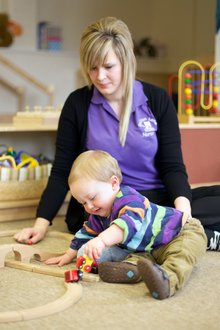By Victoria Brelsford
As parents we may often worry about our child’s behaviour especially when it becomes challenging and impacts on others. We can support our children to develop positive behaviour by recognising the factors which influence their frustrations and learn how to address these in a supportive way.
What do we mean by behaviour and what is its function?
All behaviours occur for a reason and are a form of communication which can be defined as ‘any response or action that can be seen, heard or felt’.
Unwanted behaviours can occur for a variety of reasons and are a child’s way of communicating their needs and feelings to us.
Understanding stages of development and behaviour
To get a better understanding of your children’s behaviour, it is important to know how their age and stage of development can affect their ability to communicate their needs and feelings to others. We must also respond to their needs in a way which is meaningful to them.
Crying is one of the first behaviours displayed by infants to communicate their needs. As parents we soon learn that different types of crying can help us to respond in different ways, for example whether we provide food, comfort, or stimulation to the infant.
Early experiences shape brain development and children learn from those around them. The way we respond to our child and others shows our children how to manage and handle their own feelings as they get older,
For example, in the second year of life, infants start to understand more complex emotions such as guilt and shame and are more likely to be able to understand how others feel.
Guided by us as parents, they are now starting to understand that their actions can affect others and that some behaviours are not acceptable.
Supporting positive behaviour in young children prepares them with the skills they need for future interactions through adolescence and into adulthood.
Understanding challenging behaviour
Often unwanted behaviour is a result of frustration, and your child is communicating their needs in a way they know will get attention.
As behaviours that challenge may result in your child posing a risk to themselves and others it is important that we as adults learn to understand patterns of challenging behaviour.
Recognising what may trigger an unwanted behaviour allows us to avoid unnecessary situations in the future, and where they do occur, to be prepared to respond in an appropriate and measured way which supports future positive behaviours.
Ideas for supporting positive behaviour and dealing with issues
We can support our child to manage their own thoughts and feelings in everything we do, such as using positive words and phrases, and having positive relationships with others.
Help children to practice self-control by creating opportunities for play which involve joint attention, turn taking and sharing.
Encourage your child to make their own decisions in a way which is manageable for them.
Give them simple choices, for example “would you like rice or pasta? “, “would you like to wear your red socks or your blue socks?”
And if your child does have an outburst, so long as they are not in danger of harming themselves or others, it is okay to take a deep breath and think before reacting to the challenging behaviour.
Managing your own feelings will help you deal with the situation in a more controlled manner.
Your child will learn that they do not get a ‘reaction’ from their unwanted behaviour.








